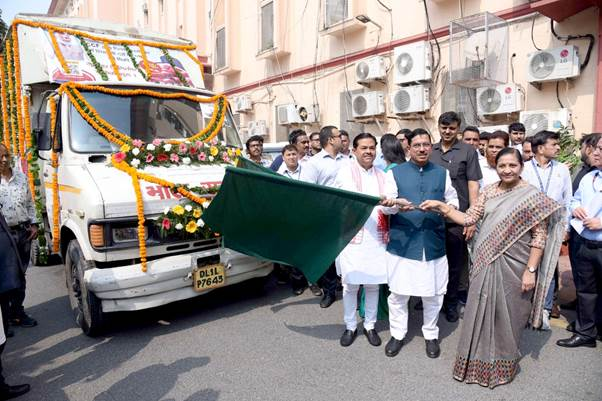Union Minister of Consumer Affairs, Food and Public Distribution & New and Renewable Energy, Shri Pralhad Joshi, today launched the retail initiative for Bharat Chana Dal Phase-II in Delhi-NCR. The launch was marked by the flagging off of mobile vans from NCCF, NAFED, and Kendriya Bhandar, aimed at providing affordable pulses to consumers. The event took place in the presence of Ministers of State, Shri B.L. Verma and Smt. Nimuben Jayantibhai Bambhaniya.
As part of this phase, the government is releasing 3 lakh tons of Chana stock from the price stabilization buffer. This stock is being processed into Chana Dal and Chana Whole, which will be available to consumers at Rs.70 per kg and Rs.58 per kg, respectively. In addition to Chana, the Bharat brand has expanded to include Moong and Masur dals, with Bharat Moong Dal priced at Rs.107 per kg, Bharat Moong Sabut at Rs.93 per kg, and Bharat Masur Dal at Rs.89 per kg. This initiative is especially timely as it enhances the availability of essential pulses to Delhi-NCR residents during the festive season.
Addressing the media, Shri Joshi highlighted the government's commitment to ensuring essential food items are available at affordable prices. "This initiative is a direct intervention by the government to stabilize the prices of staple foods such as rice, atta, dals, and onions, ensuring affordability for consumers," he said.
Government Efforts to Boost Pulse Production and Import
The Centre has implemented several policy measures to ensure pulse availability, including increasing the Minimum Support Price (MSP) for pulses each year to encourage domestic production. Additionally, for the 2024-25 season, the government has introduced a no-ceiling procurement policy for Tur, Urad, and Masur. Awareness campaigns, seed distribution, and pre-registration of farmers for assured procurement were also conducted by NCCF and NAFED during the Kharif season, with these efforts continuing for the upcoming Rabi season.
To further augment domestic production and ensure seamless imports, the government has allowed duty-free imports of pulses like Tur, Urad, Masur, and Chana until March 31, 2025, and Yellow Peas until December 31, 2024. These measures, combined with an expanded Kharif pulse cultivation area, have contributed to a reduction in pulse prices since July 2024.
Onion Price Stabilization and Distribution
In addition to pulses, the government has taken significant steps to stabilize onion prices. A total of 4.7 lakh tonnes of onions were procured from the Rabi crop for the price stabilization buffer, with 1.15 lakh tonnes already disposed of since September 5, 2024, through NCCF and NAFED. Disposal efforts have spanned 77 centers across 21 states by NCCF and 43 centers across 16 states by NAFED.
For the first time, bulk transportation of onions via rail rakes has been adopted to accelerate distribution. NCCF transported 1,600 MT of onions to Delhi via the Kanda Express from Nashik on October 20, 2024, while NAFED sent 800–840 MT to Chennai via rail rake on October 22, 2024. Indents for further shipments to Lucknow and Varanasi have also been placed.
The Department of Consumer Affairs has also requested Indian Railways to facilitate onion shipments to northeastern regions, including New Jalpaiguri (Siliguri), Dibrugarh, New Tinsukia, and Changsari, ensuring wide availability at affordable prices across India.
This series of government interventions aims to safeguard consumers from price fluctuations and ensure that essential food items remain accessible and affordable.











